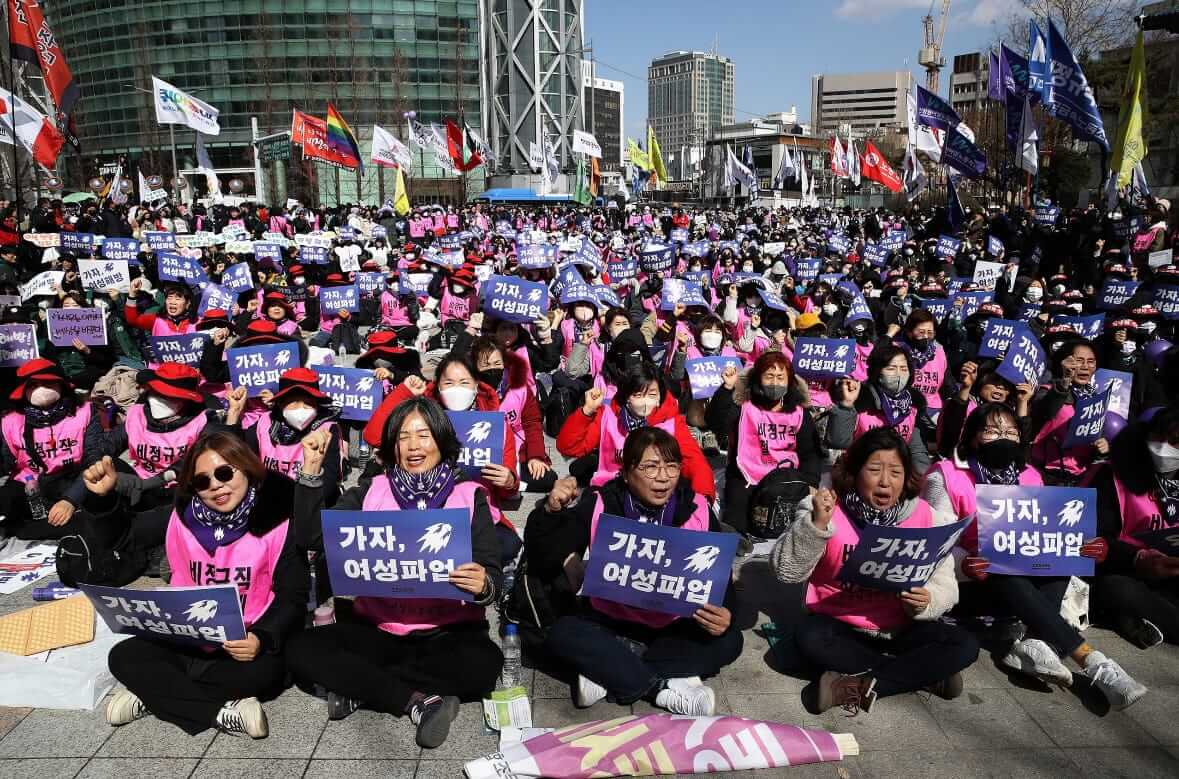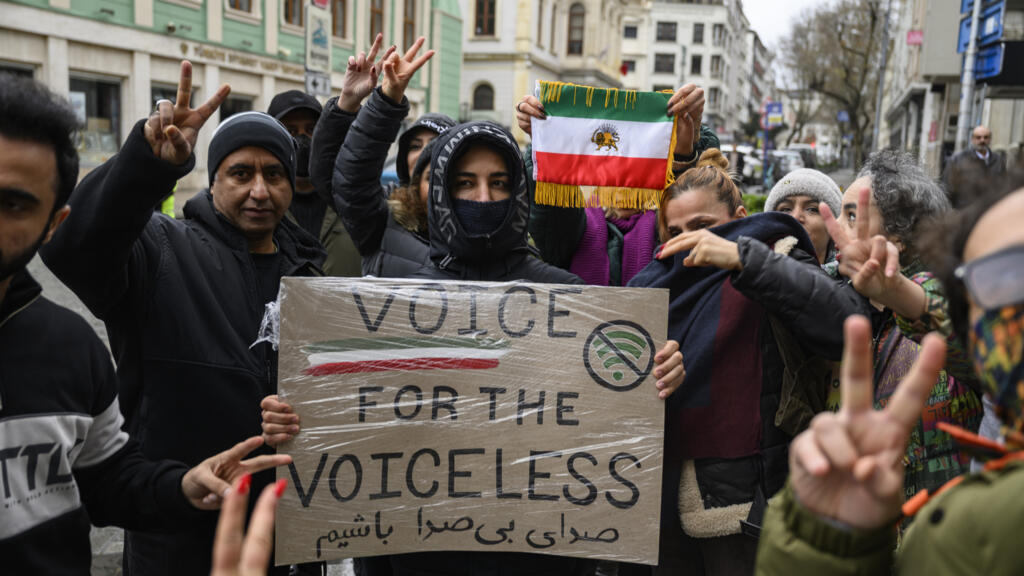The 4B movement — a radical, digitally mediated feminist refusal captured by the four “no’s” (no dating, no sex, no marriage, no childbirth) — has grown from niche Korean online subcultures into a transnational signifier of contemporary gender discontent. Emerging initially in online forums and feminist communities during the late 2010s, this movement has crystallized frustrations with entrenched patriarchy, widening income inequality, and the burden of social expectations placed on women in South Korea’s highly competitive and hierarchical society. While the refusal is framed in personal and lifestyle terms, its resonance stems from structural conditions: the intensification of precarious labor markets, prohibitive housing costs, and an educational system that imposes steep opportunity costs on family life. In this sense, 4B is not a fleeting social trend but rather a symbolic articulation of systemic disillusionment with institutions that have failed to deliver gender justice and social security.
What began as a domestic reaction has since reverberated across a broader spectrum of debates, ranging from family policy to labor markets, from cultural production to political rhetoric. The movement’s spread to international audiences — through coverage in global media, translations of online manifestos, and comparative feminist scholarship — has transformed it into a lens through which Korea’s demographic and gender crises are interpreted abroad. For international observers, 4B functions both as a warning and a case study: a warning of how severe structural pressures can manifest in forms of radical refusal, and a case study of how feminist politics intersect with broader questions of economic sustainability and population health. This dual character of the movement situates it within the wider global conversation on demographic decline, generational precarity, and the politicization of gender roles.
The effects of the 4B movement on South Korea’s foreign policy are neither direct nor linear; they emerge through a series of feedback loops in which domestic social transformation alters the context in which foreign policy decisions are made. In particular, three channels stand out. The first concerns demographic security and population policy: with birth rates at record lows, policymakers increasingly frame population decline as a strategic vulnerability, thereby making migration, labor diplomacy, and international cooperation on talent mobility central to foreign policy agendas. The second channel involves domestic political realignment and diplomatic signaling: the politicization of feminism and its contestation by conservative actors have reshaped South Korea’s ideological landscape, producing a foreign policy discourse that must reconcile progressive aspirations with socially conservative constituencies. The third channel is that of soft power and normative projection: South Korea’s ability to present itself as a modern, inclusive, and globally relevant democracy is mediated by how the international community perceives its handling of gender inequality and demographic challenges.
Taken together, these channels demonstrate how a social movement that originated as a personal refusal of intimate life choices now exerts influence on state-level strategies. The 4B movement, while not a foreign policy actor per se has become an indirect force shaping the environment in which South Korea must position itself internationally — as a state struggling with demographic decline, as a democracy negotiating gender politics, and as a cultural exporter whose soft-power narrative is increasingly intertwined with its domestic social dynamics.
To elaborate, first, the 4B movement amplifies South Korea’s demographic crisis into a securitized foreign-policy problem. South Korea’s fertility collapse — one of the world’s steepest — has been linked by analysts to a suite of structural causes, including housing unaffordability, precarious labour markets, and gender inequality; scholars and policy commentators routinely point to lifestyle refusals such as 4B as a proximate cause of falling birth rates. The practical consequence of this is that demographic concerns are now front-loaded into national security planning, alliance management, and long-term economic diplomacy: Seoul’s need to sustain a shrinking workforce shapes immigration policy, labor mobility arrangements with partners, and efforts to attract foreign talent and investment. In short, the national imperative to offset population decline makes migration, education, and trade diplomacy more salient and constrains policymakers who must reconcile pro-natal domestic politics with the economic openness required by globalization.
Second, 4B has contributed to a polarized domestic politics that conditions foreign policy choices. The movement’s visibility — and the backlash it provokes — has fed political narratives exploited by conservative politicians who frame feminism as social destabilization. President Yoon Suk-yeol’s political positioning and rhetorical accommodation of anti-feminist constituencies have signaled to foreign partners a domestic audience that prizes traditional social values and security-first policy stances, complicating Seoul’s liberal normative posture internationally. Where once gender equity debates might have been compartmentalized within domestic social policy, the politicization of feminism now reaches foreign-policy terrain: coalition calculus in the National Assembly, electoral pressures, and conservative mobilization influence defense spending, alliance signaling toward Washington, and Seoul’s readiness to engage in public diplomacy that foregrounds liberal values. The result is a South Korean foreign policy that must simultaneously manage strong alliance commitments while tamping down social controversies that could become internationalized.
Third, the normative and soft-power dimensions of the 4B phenomenon shape Seoul’s external image and its ability to export policy models. South Korea has long sought to transform its economic rise into normative influence — through cultural diplomacy, development assistance, and multilateral engagement. A conspicuous gender crisis and the international circulation of movements like 4B complicate Seoul’s soft-power narrative: allies and partners may read domestic gender frailty as a governance deficit, which can undercut South Korea’s credibility when it champions human rights or gender-responsive development abroad. Conversely, the global attention to 4B — including interest and partial adoption abroad following the 2024–25 political shifts in the United States and elsewhere — creates both reputational risks and opportunities. Seoul can either double down on technocratic, policy-driven responses (childcare subsidies, housing reform, and labour protections to shore up its international standing) or allow culture-wars to distract from structural reforms that would reinforce both domestic resilience and external credibility.
These channels produce three policy implications worth underlining. First, expect migration and labour diplomacy to rise as a permanent feature of South Korea’s external engagements. Targeted recruitment, expanded work-visa arrangements with Southeast Asia, and negotiated mobility partnerships will be politically framed as demographic necessities even if they generate domestic resistance. Second, alliance management with the United States will grow more transactional: Seoul will need American support on defense and technology, while Washington will be asked to accommodate South Korea’s social and economic imperatives (for instance, in trade and semiconductor cooperation) that mitigate demographic strain. Third, South Korea’s multilateral posture — from climate finance to development assistance — will likely emphasize technocratic solutions to family policy and gender equity, accompanied by intensified public diplomacy to counter reputational spillovers from culture-war narratives.
Finally, the limits of the 4B’s direct effect must be acknowledged. The movement is emphatically social and symbolic; its adherents are a part of a broader constellation of youth disaffection rather than the sole determinant of demographic behavior. Many young Koreans’ decisions to delay marriage or childbirth are motivated by economic insecurity as much as by ideological protest. Thus, while 4B crystallizes grievances that influence policy priorities, durable foreign-policy change will depend on how effectively Seoul translates domestic remedies (housing, labor, childcare) into a coherent external strategy that leverages migration, trade, and alliances to compensate for demographic decline.
In sum, the 4B movement is less a direct actor in Seoul’s diplomatic negotiations than a catalytic force that reshapes the domestic political-demographic environment in which foreign policy is made. Policymakers who ignore the movement’s structural implications risk being surprised by the secondary effects on migration policy, alliance politics, and South Korea’s normative standing. Those who integrate demography, gender policy, and international engagement stand the best chance of converting a domestic crisis into a managed strategic adaptation.








